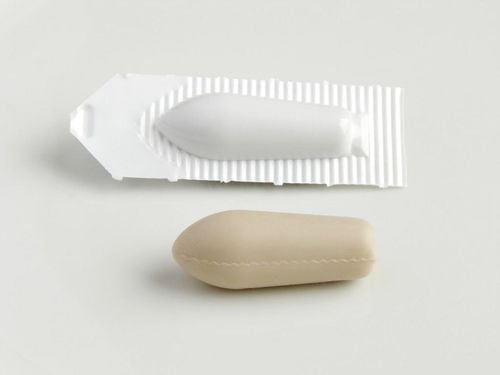Vimovo is used in cases of postpartum pain, postoperative pain, primary dysmenorrhea, migraine, etc or signs of musculoskeletal inflammation and soft tissue inflammation. So what is the use of Vimovo?
1. What is Vimovo?
Vimovo contains naproxen and esomeprazole with a content of 500mg/20mg. Which, naproxen is a non-steroidal anti-inflammatory drug with antipyretic, anti-inflammatory, and analgesic effects, belonging to the group of non-addictive analgesics, helping to relieve moderate to mild pain such as in trauma, arthritis and other musculoskeletal conditions, dysmenorrhea.
Besides the above uses, Vimovo medicine can also be used to treat several other diseases that are not listed above. Therefore, before taking medication, consult your doctor for advice and how to use the medication effectively.
2. Indications and contraindications for using Vimovo
2.1 Indications for using Vimovo
The cases where Vimovo pain reliever is indicated are the condition of mild to moderate pain in:
- Postpartum pain
- Pain after IUD insertion
- Postoperative pain
- Pain due to orthopedic surgery
- Primary dysmenorrhea
- Migraine
- Radicular pain
- Musculoskeletal and soft tissue inflammation
2.2 Contraindications for using Vimovo
The cases where Vimovo is contraindicated are:
- Allergy to naproxen
- Progressive gastric and duodenal ulcers
- Severe liver and kidney failure
3. Usage and dosage of Vimovo
Vimovo is prepared in the form of a release tablet, so it can be used on an empty or full stomach. You should take the medicine with a full glass of water to avoid stomach irritation. Swallow the tablet, do not crush or discard the tablet. The dosage of Vimovo will depend on the patient's condition and age:
- Rheumatism and osteoarthritis: Attack dose and in acute attacks: 1100mg/day. Maintenance dose 550-1100mg/day depending on the intensity of pain.
- Extra-articular rheumatism, post-operative and post-traumatic pain: usually a daily dose of 1100mg is effective. This dose must be re-evaluated in each case, but should not exceed 1375mg/day. The daily dose can be taken once or divided into 2 doses 12 hours apart.
- Dysmenorrhea: the recommended initial dose is 550mg, then 275mg every 6-8 hours, treatment duration is 3-4 days.
- Prophylaxis of migraine: the recommended dose is 550mg, 2 times/day. If the disease does not improve after 4-6 weeks of use, the drug should be discontinued.
- In case of postpartum pain: a single dose of 550 mg.
- In case of mild to moderate musculoskeletal and soft tissue inflammation, acute or chronic: the recommended starting dose for adults is 275 mg, twice a day (morning and evening) or 275 mg in the morning and 550 mg in the evening. During long-term treatment, the dose may increase or decrease depending on the patient's clinical response.
Patients should use Vimovo regularly to get the most benefit from it. To use the drug safely please take Vimovo exactly as directed by your doctor, do not overdose, and use less or longer than prescribed. Do not abuse the drug for too long or arbitrarily increase the dose of the drug. Because this not only makes the condition worse but also increases the risk of unwanted effects.
4. Unwanted effects when using Vimovo
Some unwanted effects that may occur when using Vimovo include:
- Digestive disorders
- Epigastric pain
- Headache
- Nausea
- Mild peripheral angioedema
- Tinnitus
- Dizziness
- Rash, itching
- Potential bleeding
- Asthma
Before prescribing the drug, the doctor always considers the benefits and effectiveness of Vimovo more than the risk of side effects. However, in some cases, when using Vimovo, unwanted effects may still occur. Therefore, when there are unusual signs after taking the drug, especially when a serious allergic reaction occurs with accompanying signs such as difficulty breathing, severe dizziness, swelling, rash or itching of the face, throat, tongue, etc. In this case, the patient needs to immediately notify the medical staff for immediate intervention.
5. Some notes when using Vimovo
Some notes when using Vimovo include:
- Tell your doctor if you have a history of allergy to Vimovo or any other allergies. Vimovo may contain inactive ingredients that can cause allergic reactions or other serious problems.
- Tell your doctor about all the medicines you are taking, including prescription and nonprescription medicines, herbal and dietary supplements, foods, dyes, or preservatives.
- Use the medicine with caution in people with a history of peptic ulcers, heart failure, cirrhosis, etc.
- Patients with severe extracellular dehydration, on a sodium-restricted diet, or with kidney disease need to have their kidney function assessed before taking the medicine.
- Pregnant women should not use Vimovo because it can cause birth defects, birth defects and miscarriage, especially in the first 3 months.
- Breastfeeding women should not use Vimovo because the medicine can be excreted in breast milk at a concentration of about 1% in the plasma.
If you forget to take a dose, take the missed dose as soon as possible. However, if it is close to the time for your next dose, skip the missed dose and continue taking the medicine as scheduled. Do not arbitrarily take a double dose of the medicine more than the treatment regimen. Overdosing on Vimovo can cause serious symptoms such as nausea, vomiting, abdominal pain, weakness, etc.
6. Drug interactions
Drug interactions can reduce the effectiveness of Vimovo, or increase the effects of unwanted effects. Inform your doctor about all other medicines you are taking, including vitamins, non-prescription medicines, prescription medicines, and herbal products. Do not stop, start, or change the dosage of any medicine without your doctor's approval.
Some drugs that may interact with Vimovo include:
- Heparin anticoagulants
- Lithium
- Methotrexate
- Ticlopidine
- Beta-blockers
7. How to store Vimovo
Store Vimovo at room temperature, away from light and moisture. Do not store Vimovo in damp places or the freezer. Different drugs have different storage methods, so read the instructions for storing Vimovo on the package carefully, or ask your pharmacist. Keep Vimovo out of reach of children and pets. When the drug is damaged and cannot be used anymore or has expired, dispose of the drug properly. Do not arbitrarily throw Vimovo into the environment such as water pipes or toilets unless required. Consult your waste disposal company or pharmacist for advice on how to safely dispose of Vimovo to help protect the environment.
In summary, Vimovo is used in cases of postpartum pain, postoperative pain, primary dysmenorrhea, migraine, etc. However, Vimovo can cause some unwanted effects and drug interactions, so please inform your doctor about the medications you are taking to reduce the risk of side effects and at the same time increase the effectiveness of the treatment process.
Follow the Vinmec International General Hospital website to learn more about health, nutrition, and beauty to protect the health of yourself and your loved ones.
To arrange an appointment, please call HOTLINE or make your reservation directly HERE. You may also download the MyVinmec app to schedule appointments faster and manage your reservations more conveniently.













